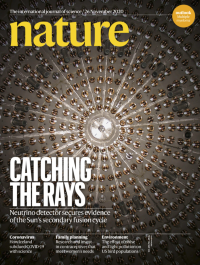
The Borexino scientific collaboration, an experiment at the Gran Sasso National Laboratories, publishes today, November 25th, 2020, in Nature the announcement of the first ever detection of neutrinos produced in the Sun by the CNO cycle (carbon-nitrogen-oxygen). It is an experimental result of historical value, which completes a chapter of physics that started in the 1930 decade of the last century. The implication of this new measure for understanding stellar mechanisms is enormous: in fact, since the CNO cycle is predominant in the most massive stars than the Sun, with this observation Borexino has reached the experimental evidence of what is in fact the dominant channel in the universe for hydrogen burning.
Previously Borexino had already studied in detail the main mechanism of energy production in the Sun, the proton-proton chain, through the individual detection of all neutrino fluxes that originate from it. Now, by measuring the neutrinos produced by the CNO cycle, which is present in the Sun at 1% level, Borexino provides the first experimental evidence of the existence of this additional energy generation mechanism.
The APC team has participated in the Borexino experiment since its conception with an important involvement in the data analysis started in 2007.
Previously Borexino had already studied in detail the main mechanism of energy production in the Sun, the proton-proton chain, through the individual detection of all neutrino fluxes that originate from it. Now, by measuring the neutrinos produced by the CNO cycle, which is present in the Sun at 1% level, Borexino provides the first experimental evidence of the existence of this additional energy generation mechanism.
The APC team has participated in the Borexino experiment since its conception with an important involvement in the data analysis started in 2007.
Nature : https://www.nature.com/nature/volumes/587/issues/7835
Services/Groupes:
- Particules
Objet de la publication:
Faits marquants projets
